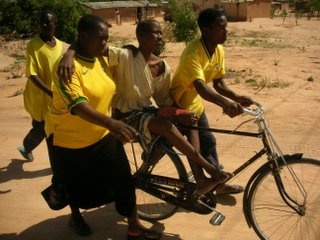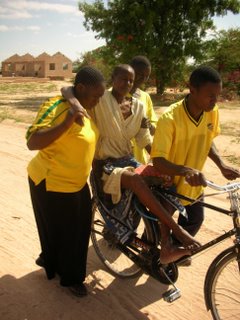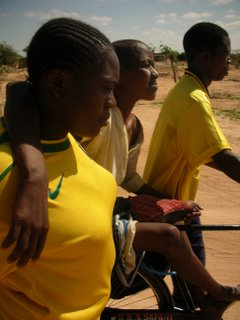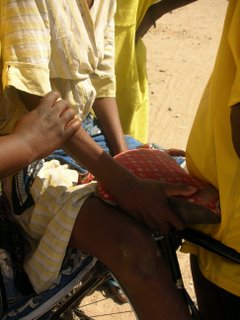Solidarity


(first photo taken by Dan Holcomb-LAHASH; the rest are my photos)
Zana is so weak that she can’t walk. She is only 31 years old. She mainly sleeps most of the day on her thin mattress which lay in four separate strips forcing her to lay part way between cracks. She became so sick a few months ago that she stopped walking and exercising and now her legs and muscles have atrophied. After being seriously sick a couple months ago, a member of our church Mzee Mwita and a few others went to see herand encourage her to be tested at the hospital to see what was wrong. After she went, she found out she was HIV positive which was causing a lot of problems—chronic diarrhea, bad chest cough, bad headaches...some of the possible symptoms of HIV. Now the church and our program have been visiting and bringing food to her at home to increase her diet (which hasn’t been so successful because her daughters aren’t always taking care of her—one of them is never around) and some people have stolen some of her food.
Zana is not getting any exercise for her legs or sitting up, going outside to get fresh air, or eating enough. Her care-givers are her two young daughters who haven’t been able to care for her adequately. She is coughing a lot and shakes her whole body every time she sits or gets up. Her emotional and psychological state has changed quite a bit too since the first time I saw her. The last few weeks my friend Joyce and I have been taking her to the hospital to get some extra tests done to see what kind of ARV treatment she will need. We were able to use the pastors car to take her to check CD4 to see if she needs ARVs and go get an x-ray done at another hospital. We had to carry her or hold her up as her long, thin legs took gigantic steps. We had to guide her into the testing rooms, and she was exhausted, tired and sore at the end of each day...sometimes smiling and saying a few words, but often in a lot of pain and discomfort.
Last week we again had access to the pastor’s car a bit so we have been driving to Ipagala with Joyce to pick her up and drive out to Tumaini Clinic (Village of Hope). Because Zana can’t walk it seemed the best mode of transport—either that or a very expensive taxi ride.
We took her by car last week Wednesday (Dec.21) for some multiple tests and needed to go back with her to get the answers, results that same week. We had come to her house to pick her up to go Thursday but one her oldest daughter Monica was not there to go with us to the hospital—which was necessary so that she could get more information on how to take care of her at home. Even though we told her to be ready, she decided to go to the market that day. (I’m not completely clear but there are some uneasy relationships between the oldest daughter and her mother Zana).
So we decided to go take Zana back to the hospital on Friday (December 23) even though we didn’t have a vehicle that day. Joyce and I got up early and headed to Zana’s house which is about 5 km from town center. The hospital is another 5 km from the house of Zana in Ipagala. We decided that we would try to get Zana to the hospital by dala dala (small-van-taxi, which is very inexpensive). We had to figure out another way to get her there without a car.
We tried to bargain and make a deal with the dala dala drivers to go pick Zana up on route to the hospital. One agreed and then failed to do so, so we had to get on another dala dala and backtrack a bit. We then walked to the second dala dala stand and asked if the driver could take us to the house and then the hospital and he made a ridiculous offer (50,000 shillings—almost the equivalent of 50 USD). Joyce and I laughed pretty hard and walked away, and Joyce kept commenting that we’d find another way.
That week, the story of the paralytic being carried on a mat by his friends to Jesus kept coming to mind. I sort of began questioning the necessity of the vehicle. I was uncomfortable using a car too much, because I didn’t want it to be an expectation, or assumption that we would always have a car—and that’s what we were good for---even though it can be convenient--- I was beginning to feel like whenever we drove a car we became a “material” resource rather than a “personal” resource. This program is still small enough that we don’t need a car right now—(maybe later).
I’d rather ride my bike in the sunshine anyway and put any food donations on the back seat or "chicken seat” when we go visit people. And of course the other problem with cars—their expensive to operate and they pollute! I ran out of gas five times last week so did my fair share of walking to gas stations with an empty bucket (yeah maybe I could have been more attentive but we have to be so thrifty with gas money and the pastor’s car is also temperamental—needing a glass of water every morning, afternoon, and evening like a baby.)
So I began to wonder if there was another simpler form of transport to take people who couldn’t walk. I reflected some on the story and wondered how far they carried their friend who was paralyzed, and if there was any other option than to go by foot—probably not.
As we were walking along that Friday, I told Joyce that I had been thinking about that story and she said, “Don’t worry, we will find a way---God will make a way.” Joyce agreed that it was really expensive for us to operate a vehicle. (Our small HIV support fund would be eaten up quickly). A man with a vegetable cart walked by and we began to joke that we could take her via vegetable cart to the big road then lift her unto the dala-dala and go directly to the hospital from there.
When we finally arrived at the house after a long walk, Joyce told the daughters to get ready to go, to dress Zana and get her breakfast--at least to drink some porridge (uji). They asked where the car was, and Joyce asked, “Where were you yesterday when we came with the car?” Joyce continued to say we would get her to the hospital even if we carried her all the way.
We went in and talked to Zana, and then brought her outside to sit on the mat, where she could get some fresh air. She kept trying to lay down and Joyce kept telling her to practice sitting up since it was bad for the heart and soul to lay down so much (its discouraging). Her CD4 count is still fairly high, 180—but low enough that she needs to start ARV’s.
Her daughter brought a bowl of water outside to wash her face and then smeared her dusty, tired face and head with oil. Every once in a while Zana will smile and mumble something that would make her chuckle.
We continued to sit and wait outside. Neighbors came by seeing what we were up too, a bit surprised not to see the vehicle. When Joyce asked one girl to help carry Zana to the big road, she dropped her jaw, and said it was way too far.
Two young men in bright yellow shirts, blue slacks and flip flops walked by, they had come to visit Zana. They sat down and joined us and Joyce continued talking and talking about this and that and a small crowd of children and others just sat and listened. Joyce was joking with the daughters of Zana that they had “picked the small bitter mangoes to early”—Monica who is 17—has a one year old baby—and Rebecca who is 15, is pregnant and is starting to show. Joyce seems to be able to make anyone laugh (it’s a gift she has)—Monica and Rebecca were laughing at her--even when she was teasing them.
Then one of the boys asked what we were planning to do and we told him we wanted to take Zana to the hospital today but we had no vehicle, and we said we may just have to carry her. He then told his little sister to go and fetch his bicycle. She took off running in her high heels for about five steps before kicking them off and trodding off barefoot on the dusty ground. She came back after 20 minutes or so with the bicycle.
When the bike came we all stood up. Then one of the boys named Yohana said we needed to pray. He prayed fow awhile asking God to give us a safe journey, praying that God would take care of Zana and bring her back to health, and that he would be near her. I’m still struggling to understand Swahili—often when people pray, I seem to fall in too the rhythm and sound of their words and utter my own prayers. I felt moved by Yohana’s prayer though--I could sense a deep power, earnestness and love in his heart.
When we were finished I was totally curious how we were going to transport Zana by bicycle—she obviously wasn’t going to ride it. I wasn’t sure what we were going to do exactly---I thought maybe the boys were going to put her on one of their laps and bike to the big road.
But when we picked up Zana, they directed us to put her on the bike so that she was strattling “the chicken seat” with her arms and legs facing the front she could grab the seat. Her legs were resting and curled on the front bar so they wouldn’t get caught in the chains. Then the other boy John, grabbed the steering handles and Joyce and Yohana put their arms on the back of Zana and they started to push the bicycle forward. They began to move quickly and I had to walk fast to even keep up with them. Zana at first was struggling to stay on, she seemed to want to roll off, but Joyce put her arm around her and they kept walking. Monica and some other girls followed on foot.
All three of those pushing the bicycle and holding Zana were wearing bright yellow shirts. They looked like the Brazilian soccer team (in fact-- Joyce was wearing her Brazil jersey that day). They continued pushing the bicycle, making sure Zana was comfortable and didn’t fall. They walked quickly and swiftly, as John’s long, sinuous arms were guiding the bicycle. It was a stunning sight. I took out my camera and began to take some pics.


Zana’s face grimaced and shone at the same time. It seemed like the light of the sun was painful at first but seemed to give her new life. It was good for her to be outside again, feel the wind on her face and the sunlight—it seemed to be rejuvenating her instead of laying on the remnants of a mattress in her tiny, warm, dark room in the corner--with no one making her sit up and taking her outside. But she seemed a bit fearful and tired. She shut her eyes most of the time and leaned into Joyce like she was in pain.


The more I glanced at them I felt this slow realization. When I looked at Zana again and again on the bicycle I began to see myself. I saw a picture of humanity in its brokenness and beauty. I saw my weaknesses and strengths.
And I saw all people.
I saw how we can all suffer from illnesses, rejection, loneliness, and neglect. I saw how we all make bad choices that dehumanize others and ourselves, often falling victim to social and personal problems.
I saw how lost we are.
We all need help emotionally, spiritually and physically. We all have needs that aren’t met which puts us all in a state of angst and alienation, no matter who is around us sometimes.
And I saw how we can still simultaneously feel the warmth of the sun even while we feel pain-- sometimes feeling the sting of discomfort at is exposure upon our nakedness.
As I looked at Zana and the others pushing her along and walking beside her I was struck in awe by the beauty of them all.
I gazed at those moving beside and with Zana. And a thought arouse that these are the beautiful feet of the One who came to be with us. This was God with Us—Emmanuel, surrounding us with his presence, picking us up and walking beside us. Maybe the thought came to mind because it was two days before Christmas, I’m not sure.
We walked past homes, and people turned to look at the sight of all of the people pushing Zana on the bicycle. Little kids stopped playing to watch. Right before we got to the big road after about 20 minutes or so, went up a short hill and then stopped to wait for a dala dala. We figured we could lift her into a dala dala and then get dropped off right at the door of the hospital if we asked.


A dala dala came and we got on, picking up Zana and putting her on one of the seats. We said thank you and shook hands with John and Yohana. I felt humbled and challenged by their actions and kindness that day.
We got to the door of the hospital and brought Zana up the steps and into the waiting room. We finally got her results back and were able to get medication for her. It’s a lot of medication to start out with, and it’s very strong. A person has to be able to eat a lot of food or they will feel very sick. It took a long time as I sat with Monica, Zana’s oldest as the nurse and doctor explained the need for a strict schedule to take her pills every morning and night, and a good nutrition program—if they can make enough money to buy the fruits and vegetables she needs. We are helping them with what we can. We also got a referral for Zana to start going to the other hospital to start physical therapy so she can do more exercises to gain her strength and balance back.
Zana got a second ride on a bicycle that day when Joyce took her by dala dala to the place where we got on the dala dala the first time, and another man offered to carry her home on his bicycle. I had to remain with Monica at the hospital to get all the medication sorted out.
I met Joyce later when at another drop off point after she got Zana back to her house and we headed back to the church.
The whole day I kept thinking about what happened in the morning. I was so humbled and challenged by those who put Zana on her bike that day, carrying her and walking beside her. I kept telling/teasing Joyce later, declaring "you are Jesus." and she would burst out laughing, so that her whole body sort of shook like she was about to start dancing some new steps from the latest choir practice. She slapped my hand and said, “Ah, Joanaa! Now you’ll have another story to preach about in church some day.”
The picture of Zana on the bicycle I think will stay with me for awhile. An image of God with us when we are broken, lonely, afraid, and sick. Directing us, holding us, and watching us from behind if we fall. When we are even too weak to pedal, even open our eyes, with our legs crossed across the bar---we are pushed, guided and held at the same time.
This is the message of Christ, the Gospel of peace. Christ came to a dark world. The Messiah came to be with us and to walk with us on foot, on the hillside, in the wilderness, in the garden, and on the road to the hospital on a bicycle.
Christ is the light in the darkness. Christ walks with us in this world full of pain, and suffering--love and beauty.
The people I saw that day were the Presence and Spirit of Christ—


Father, Son and Holy Spirit
Christ Before Us, Christ Beside Us, Christ Behind Us.
Light Before Us, Light Beside Us, Light Behind Us.
God With Us.
Solidarity.
Emmanuel.

Pray for Zana—she is very sick....we are going to visit her again tomorrow, (Saturday Dec 31) we have already seen her twice this week...
Pray for her family and daughters that they can take care of her well and that any reconciliation that needs to take place will happen…
Both Zana and her daughters entered prostitution to get money because they were poor—pray that they will have other options, and that we can help them not have to make that choice
Pray for Zana’s health—her body needs healing...pray that she can stay on the medicine and not throw up, she’s having serious difficulties and has been throwing up the medicine and food—we may need to get a drip for her tomorrow…
Some more reflections---
On one of those days as he was teaching, Pharisees and teachers of the law were sitting there who had come from every village of Galilee and Judea and from Jerusalem. And the power of the Lord was with him to heal. And behold some men were bringing on a bed a man who was paralyzed and they were seeking to bring him in and lay him before Jesus, but finding no way to bring him in because of the crowd, they went up on the roof and let him down with his bed through the tiles into the midst before Jesus. And when he saw their faith he said, “Man your sins are forgiven you.” And the scribes and Pharisees began to question him, saying, “Who is this who speaks blasphemies? Who can forgive sins but God alone?” When Jesus perceived their thoughts he answered them, “why do you question in your hearts? Which is easier to say, your sins are forgiven you or rise up and walk? But so that you may know that the Son of Man has authority on earth to forgive sins”--he said to the man who was paralyzed –“I say to you rise, pick up your bed and go home,” and immediately he got up before them picked up what he had been laying on and went home glorifying God. And amazement seized them all and they glorified god and were filled with awe saying, “We have seen extraordinary things today.”
Luke 5:17-2
I guess when I read this story now I can envision people here carrying the sick—esp those suffering from HIV/AIDS---I can imagine people bringing those who were very sick by bicycle to the feet of Jesus.
Maybe I almost forgot that cars are not the only option or mode of transport to carry the sick, wounded or paralyzed to the hospital. People can forget the faith, devotion to others, and creativity of those who can help make a way for healing for those who are suffering even if they have to carry them on their own backs. The compassion, courage and commitment of people should be more dependable than any form of modern day transport. But tragically enough—we sometimes fail to have a greater vision because we are blinded by the obstacles—and hesitate too soon.
The compassion, courage and commitment of others should inspire more resources given to those who are suffering, but not just in material resources—but in the resource of the person. That means living and being with people giving encouragement, friendship and love, whoever you are.
That is Solidarity. That is Emmanuel.
Are we too dependant on material resources than on the power of the human spirit to succeed even when things seem impossible or too difficult for us? Do we look first for how God has already equipped and is empowering his children to do his work, caring for others, before we think having certain equipment will solve all the answers, making our assumptions subject to a false dependency or superiority too soon?
I am not saying that having a car and getting resources to assist programs is bad. (God knows we need more resources for this program). We all need to do more—individually, corporately and internationally to help those living with HIV/AIDS—assistance for orphans, widows, access to good health care and medicine—in local, national and international initiatives and laws---education, nutritious food and water, protection of property rights, community work that is sensitized to gender issues, stigma reduction, tackling poverty--grass roots small enterprise initiatives to working globally for fair trade laws to increase economic development---all these aspects are interwoven. all these issues are about justice for fellow human beings.
But I also wanted to say that we need to continually ask ourselves if we are blind to the way that God might be suggesting/leaving room to move in his own way and provision---using his children to demonstrate justice, humility, love and mercy? That is why partnering and building relationships with people whatever service or assistance someone is rendering is so necessary.
We also have to ask ourselves if we are too blind to see that God is with us and with others before anything arrives.
The one who came to heal is with us. Carrying, leading, and guiding. Being present.
Christ arrived first. Christ is here.

0 Comments:
Post a Comment
<< Home